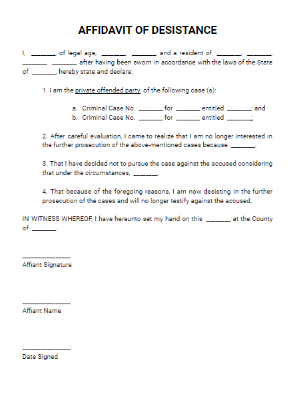- Eviction Notice Forms
- Power of Attorney Forms Forms
- Bill of Sale (Purchase Agreement) Forms
- Lease Agreement Forms
- Rental Application Forms
- Living Will Forms Forms
- Recommendation Letters Forms
- Resignation Letters Forms
- Release of Liability Agreement Forms
- Promissory Note Forms
- LLC Operating Agreement Forms
- Deed of Sale Forms
- Consent Form Forms
- Support Affidavit Forms
- Paternity Affidavit Forms
- Marital Affidavit Forms
- Financial Affidavit Forms
- Residential Affidavit Forms
- Affidavit of Identity Forms
- Affidavit of Title Forms
- Employment Affidavit Forms
- Affidavit of Loss Forms
- Gift Affidavit Forms
- Small Estate Affidavit Forms
- Service Affidavit Forms
- Heirship Affidavit Forms
- Survivorship Affidavit Forms
- Desistance Affidavit Forms
- Discrepancy Affidavit Forms
- Guardianship Affidavit Forms
- Undertaking Affidavit Forms
- General Affidavit Forms
- Affidavit of Death Forms
Desistance Affidavit
In the legal world, everything we say or do can leave a mark. And once we make an official statement about an event or person, it will be on record forever. That’s when a Desistance Affidavit comes to play to help settle disputes. But the common misconception surrounding the use of a Desistance Affidavit is the belief that it can bar prosecutors (particularly the State or Government) from taking action. Although the impact of the affidavit is relatively minimal, especially with strong evidence against the accused, a Desistance Affidavit can still be useful in pursuing civil indemnity. Read More

By Type
Desistance Affidavit
In the legal world, everything we say or do can leave a mark. And once we make an official statement about an event or person, it will be on record forever. That’s when a Desistance Affidavit comes to play to help settle disputes. But the common misconception surrounding the use of a Desistance Affidavit is the belief that it can bar prosecutors (particularly the State or Government) from taking action. Although the impact of the affidavit is relatively minimal, especially with strong evidence against the accused, a Desistance Affidavit can still be useful in pursuing civil indemnity.
What Is a Desistance Affidavit?
A Desistance Affidavit is a sworn statement that complainants file to express that they will no longer institute any actions against the accused, which includes cooperating with investigators and prosecuting and testifying in court. While it’s not enough to conclude the case, the court may still use the affidavit as grounds for the case’s dismissal. However, if the court finds the accused guilty of a crime even without the testimony of the offended party, the accused will still face legal consequences.
How to Make a Desistance Affidavit
You can create any type of affidavit without hiring a lawyer to do it for you. Listed below are a few guidelines to remember when drafting the document.
Gather the necessary information
A desistance affidavit must contain a brief description of the complaint or criminal case at hand, which may include the complaint or case number, the crime committed, and the court address. To ensure accuracy, you may consult the appropriate agencies to verify this information beforehand. It might also be best to refrain from letting any law enforcement officer or criminal investigator know about your plans to withdraw from the case until the affidavit is ready.
Identify the parties involved
Typically, the parties in a desistance affidavit are the complainant (who is the affiant in the affidavit) and the accused. In identifying these parties, make sure to state their full legal names. The same goes for cases that involve business entities. Other details such as each party’s age, gender, residential address, and nationality are optional, but you may include them for proper identification.
Include a statement of truth
Lying in an affidavit is a crime that is punishable in the court of law. Committing an act of perjury will only put you in a mentally and financially draining situation. But if you fully understand the legal consequences of the affidavit and swear that the information presented in the document is true and correct to the best of your knowledge, a sworn statement should do you no harm. It also confirms that you’re aware of the circumstances at hand and you’re willing to accept the consequences that may transpire as a result of filing the affidavit.
Get it notarized
Make sure you have the affidavit notarized if you want the court to acknowledge it. To do this, you only need to meet with a notary public who will review the affidavit and verify your identity as the affiant. Keep in mind that a notary is not in the position to give legal advice about your case, so refrain from asking specific legal questions that only someone familiar with your situation should answer.
FAQs
When do I use a desistance affidavit?
There are many reasons why a person would rather desist from a complaint or case against another party, and it often has something to do with private settlements, wrongful convictions, and legal costs and expenses. The mental, emotional, and financial baggage that comes with filing a complaint, cooperating with investigators, and attending court hearings can be too much for some people to bear. A desistance affidavits allows individuals to notify the investigating authorities about their decision.
What are the effects of a desistance affidavit on a criminal case?
A desistance affidavit does not have the power to drop a complaint or case and erase any evidence found during the investigation. To put it bluntly, the affidavit won’t make anything and everything disappear with a snap of a finger. It’s not unusual for a victim to recant a claim against their attacker, which is sometimes rooted in the victim’s fear of further violence and threat. Thus, prosecutors may continue the case and analyze other forms of evidence even without the victim’s support.
What are the risks of a desistance affidavit?
While a desistance affidavit can be helpful in some circumstances, people often fail to recognize the fact that once they file a complaint or case against another person or entity, there’s no turning back. Ultimately, the decision to dismiss the complaint or case is up to the investigator or judge in charge. It’s also unfortunate how common it has become for individuals to tailor their complaints or cases in an attempt to coerce the adverse party to act in their favor. In such instances, it’s often more advisable for parties to settle matters between themselves (and without court interference) first before escalating things to the higher authorities.
Where do I file a desistance affidavit?
You can file a desistance affidavit with the same office or court where you first filed your complaint. Oftentimes, those who choose to withdraw their claims file the affidavit during the early stages of the investigation when little evidence is available for prosecutors to use. Without further testimonies from the complainant and the lack of evidence to pursue charges, the likelihood of complaint or case dismissal is reasonably high.
What is the difference between a recantation and a desistance affidavit?
Recantation means changing or withdrawing a testimony or statement previously given to the authorities. When a victim or witness of a crime declares that these allegations aren’t true, prosecutors may still continue their investigation and move forward with charges despite the former’s refusal to cooperate. An affidavit of desistance serves a similar purpose, allowing the complainant to express under oath their disinterest in a case and withdrawal from any further proceedings.
Although a desistance affidavit is just one of the many options available for complainants to mediate pending cases, you should always consider settling matters outside of court if you have the opportunity to do so. It’s also important to seek legal advice from the appropriate entities for guidance.
